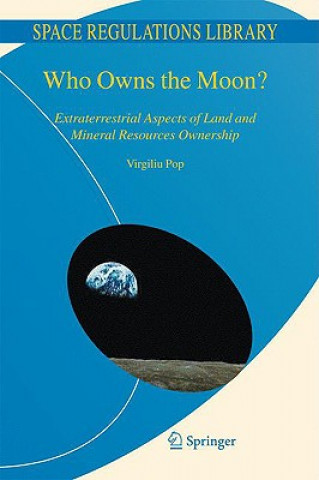
Versand
Kaufberater





Passt nicht? Macht nichts! Bei uns ist die Rückgabe innerhalb von 30 Tagen möglich
 Geschenkgutschein
In einem beliebigen Wert
Geschenkgutschein
In einem beliebigen Wert
Mit einem Geschenkgutschein können Sie nichts falsch machen. Der Beschenkte kann sich im Tausch gegen einen Geschenkgutschein etwas aus unserem Sortiment aussuchen.
Who Owns the Moon?
 Englisch
Englisch
 537 b
537 b
30 Tage für die Rückgabe der Ware
Das könnte Sie auch interessieren


This work investigates the permissibility and viability of property rights on the celestial bodies, particularly the extraterrestrial aspects of land and mineral resources ownership. In lay terms, it aims to find an answer to the question Who owns the Moon? §The first chapter critically analyses and dismantles with legal arguments the issue of sale of extraterrestrial real estate, after having perused some of the trivial claims of celestial bodies ownership. The only consequence these claims have on the plane of space law is to highlight the need for a better regulation of extraterrestrial landed property rights.§Next, the work addresses the apparent silence of the law in the field of extraterrestrial landed property, scrutinizing whether the factual situation on the extraterrestrial realms calls for legal regulations.§The sources of law are examined in their dual dimension that is, the facts that have caused and shaped the law of extraterrestrial real estate, and the norms which express this law. It is found that the norms and rules regarding property rights in the celestial realms are rather limited, failing to define basic concepts such as celestial body.§The following chapter examines precisely this issue, pondering whether asteroids and comets are immovable land-like territorial extensions that cannot be legally appropriated, or floating movable goods, capable of being captured and reduced into private ownership. The employment of the spatialist and functionalist approaches, the use of the criterion of actual movability from orbit by human action, and original theories such as the analogy between the legal status of asteroids and icebergs, are considered, concluding that some extraterrestrial resources are not, legally speaking, celestial bodies.§An examination follows of the relationship between appropriation under international law, and civil law appropriation, namely whether the non-appropriation principle in the Outer Space Treaty on the international plane, results also in the prohibition of the appropriation of the celestial bodies on the private property rights plane. It is offered that, while appropriation of land can exist outside the sphere of sovereignty, its survival is dependent upon backing from a sovereign entity, yet such endorsement would be unlawful as a means of national appropriation.§The next chapter answers to the main question of this thesis, offering that de lege lata the extraterrestrial realms, as a commons, belong to everybody and nobody. The contents of Res communis is duly scrutinized. Res publica is then presented together with the "Public Trust Doctrine". The commons regime currently accepted by most space actors is being challenged on two fronts. On the left, the adepts of the Common Heritage of Mankind paradigm have enacted the Moon Agreement, effectively planting the Marxist standard in the lunar soil. The egalitarian regime of extraterrestrial resource development would sanction the culture of entitlement, favouring a fair outcome over fair process. Such an approach has failed on earth and is poised to fail in outer space, as argued in the following chapter.
Informationen zum Buch
 Englisch
Englisch
Kategorie


 Kontakt
Kontakt Wie einkaufen
Wie einkaufen


































